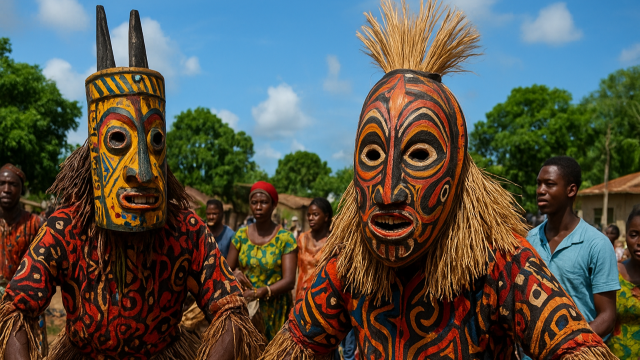In Gabon, celebration is never far from ritual, and ritual is rarely separated from history. Across towns and villages, festivals unfold as vibrant expressions of identity, bringing together dozens of ethnic groups in a shared affirmation of cultural heritage. These events, at once solemn and jubilant, trace lines between the spiritual and the communal, reminding participants of the values that hold communities together.
The Central African nation is home to more than 40 distinct groups, each contributing its own customs, languages, and art forms. The convergence of these traditions is perhaps most visible during public festivals, where masks, music, and movement transform familiar spaces into theaters of collective memory.
Among the most striking is the Festival of Masks, staged in regions including Franceville. Local artisans craft elaborate wooden masks painted in vivid colors, their designs representing ancestral spirits, natural forces, or protective deities. During the festival, dancers wearing these masks perform in ceremonies that are as much acts of reverence as they are displays of artistry. The performances not only celebrate creativity but also reaffirm bonds between the living and the ancestral world.
Equally profound are the Bwiti initiation ceremonies practiced by the Fang people. These rites of passage blend music, chant, and dance with spiritual rituals, including the use of sacred plants believed to facilitate communion with the spirit realm. For participants, the ceremonies mark both personal transformation and the continuity of communal traditions that have guided Fang society for generations.
Coastal communities, meanwhile, express their heritage through the Festival of the Sea, held annually in Port-Gentil. The event highlights the intimate relationship between the ocean and daily life. Traditional fishing competitions draw large crowds, while culinary exhibitions showcase the bounty of the Atlantic. The festival underscores the ways in which the sea sustains both economy and culture, positioning maritime life as a defining element of Gabonese identity.
Music, too, occupies a central role in national celebrations. The Gabonese Music Festival gathers performers from across the country, merging ancient rhythms with contemporary influences. Drums and thumb pianos share the stage with electric guitars and modern dance beats, creating a dialogue between past and present. The festival not only entertains but also ensures the endurance of musical traditions in a rapidly changing cultural landscape.
Taken together, these festivals form a mosaic of Gabon’s diversity. They are more than spectacles; they are living narratives, vehicles of continuity in a nation balancing preservation and innovation. Each gathering offers a space for communities to reaffirm their heritage while adapting it to modern realities.
In the swirl of music, masks, and movement, Gabon’s festivals reveal a society that draws strength from tradition even as it embraces change. They remain vivid reminders that culture, when celebrated collectively, is both anchor and compass.
Sources
- Fernandez, James W. Bwiti: An Ethnography of the Religious Imagination in Africa. Princeton University Press, 1982.
- Perrois, Louis. Art of Gabon. Orstom Éditions, 1985.
- Encyclopaedia Britannica. “Gabon: Cultural Life.” Accessed 2025.
- UNESCO Intangible Cultural Heritage. “Mask Traditions of Central Africa.” Accessed 2025.


